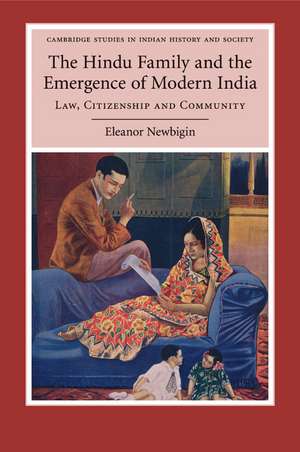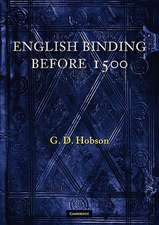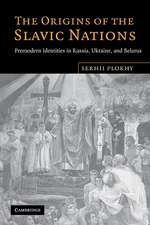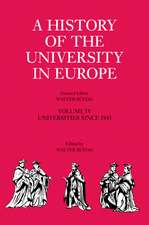The Hindu Family and the Emergence of Modern India: Law, Citizenship and Community: Cambridge Studies in Indian History and Society, cartea 22
Autor Eleanor Newbiginen Limba Engleză Paperback – 10 mai 2017
| Toate formatele și edițiile | Preț | Express |
|---|---|---|
| Paperback (1) | 284.56 lei 6-8 săpt. | |
| Cambridge University Press – 10 mai 2017 | 284.56 lei 6-8 săpt. | |
| Hardback (1) | 694.23 lei 6-8 săpt. | |
| Cambridge University Press – 18 sep 2013 | 694.23 lei 6-8 săpt. |
Din seria Cambridge Studies in Indian History and Society
-
 Preț: 284.98 lei
Preț: 284.98 lei -
 Preț: 403.33 lei
Preț: 403.33 lei -
 Preț: 207.91 lei
Preț: 207.91 lei -
 Preț: 319.99 lei
Preț: 319.99 lei -
 Preț: 323.00 lei
Preț: 323.00 lei -
 Preț: 293.17 lei
Preț: 293.17 lei -
 Preț: 299.44 lei
Preț: 299.44 lei -
 Preț: 376.82 lei
Preț: 376.82 lei -
 Preț: 284.01 lei
Preț: 284.01 lei -
 Preț: 308.88 lei
Preț: 308.88 lei -
 Preț: 285.93 lei
Preț: 285.93 lei -
 Preț: 209.65 lei
Preț: 209.65 lei -
 Preț: 320.55 lei
Preț: 320.55 lei -
 Preț: 286.30 lei
Preț: 286.30 lei -
 Preț: 322.51 lei
Preț: 322.51 lei -
 Preț: 418.39 lei
Preț: 418.39 lei -
 Preț: 390.64 lei
Preț: 390.64 lei -
 Preț: 417.07 lei
Preț: 417.07 lei -
 Preț: 427.94 lei
Preț: 427.94 lei -
 Preț: 367.96 lei
Preț: 367.96 lei -
 Preț: 349.20 lei
Preț: 349.20 lei - 11%
 Preț: 552.73 lei
Preț: 552.73 lei
Preț: 284.56 lei
Nou
Puncte Express: 427
Preț estimativ în valută:
54.45€ • 56.85$ • 45.06£
54.45€ • 56.85$ • 45.06£
Carte tipărită la comandă
Livrare economică 04-18 aprilie
Preluare comenzi: 021 569.72.76
Specificații
ISBN-13: 9781316648568
ISBN-10: 1316648567
Pagini: 278
Ilustrații: 2 maps 7 tables
Dimensiuni: 153 x 230 x 15 mm
Greutate: 0.38 kg
Editura: Cambridge University Press
Colecția Cambridge University Press
Seria Cambridge Studies in Indian History and Society
Locul publicării:New York, United States
ISBN-10: 1316648567
Pagini: 278
Ilustrații: 2 maps 7 tables
Dimensiuni: 153 x 230 x 15 mm
Greutate: 0.38 kg
Editura: Cambridge University Press
Colecția Cambridge University Press
Seria Cambridge Studies in Indian History and Society
Locul publicării:New York, United States
Cuprins
1. Making the modern Indian family: property rights and the individual in colonial law; 2. Financing a new citizenship: the Hindu family, income tax and political representation in late-colonial India; 3. Wives and property or wives as property? The Hindu family and women's property rights; 4. The Hindu Code Bill: creating the modern, Hindu legal subject; 5. B. R. Ambedkar's Code Bill: caste, marriage and post-colonial Indian citizenship; 6. Family, nation and economy: establishing a post-colonial patriarchy.
Notă biografică
Descriere
A study of how the development of representative politics in late-colonial India transformed notions of family, gender and religious community.











